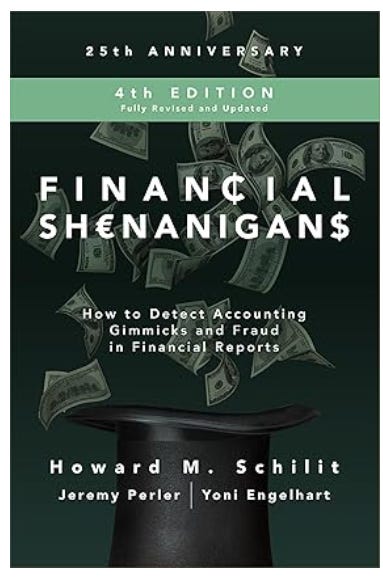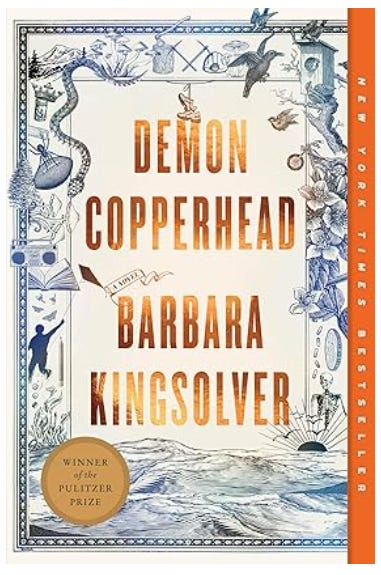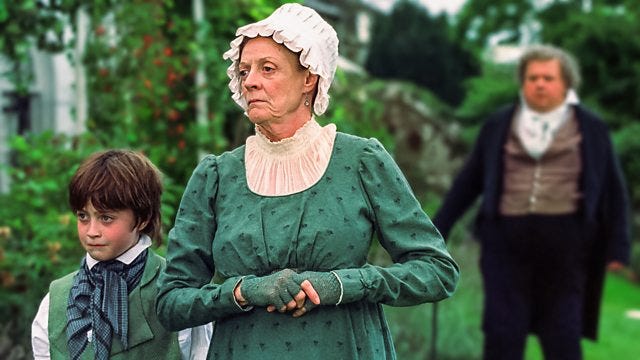The Week in Meep: Open Comments, a Chicago Nugget, Financial Shenanigans, and Demon Copperhead
Any reading recommendations?
First, I decided to do a little experiment, which may be of a short term. I will let it run until Labor Day.
For the Week in Meep posts, I will let comments be open to all.
Usually, I only allow paid subscribers to comment. (That is my sole benefit for paid subscriptions currently. Mainly, because I want people to read what I write.)
But I thought I’d let others comment on these weekend brain dumps. If it goes well, I will let it continue… if not, well then. I have only so much brain space and time. I do not apologize for that.
Chicago Nugget from Austin Berg: On That Lack of Audited CTU Financials…
I don’t think I will have time to get to this soon, so I wanted to be sure to link to Austin Berg:
There haven’t been CTU financials released to the union membership… since 2020.
I noticed that last year, when the union leader was engaging in some ridiculous posturing regarding budgeting. (It was Austin Berg pointing it out, btw — via the Illinois Policy Institute).
My comment last year:
If something ugly or untoward is in there, it will come out….eventually.
Trying to hide it with, oh, I dunno, absurd posturing re: contract negotiation is a tactic, but I wouldn’t count on papering over malfeasance or poor financial management, if that’s what’s going on.
There is more I didn’t quote, but four audits not yet released… well. It might be smarter to just resign and walk away. Brazening it out isn’t working so well for other people getting caught out lately, who are finding out that oh, wait, you really expected us to be transparent? What?
At this point, I hope they’ve got good lawyers on retainer.
I think it’s a case of “We’ll all go down together”.
Financial Shenanigans: A Public Company Classic
I just finished reading the 4th edition of this classic today: Financial Shenanigans, intended to help people who are investors in individual names in publicly-traded companies:
I highly recommend this book, but I have two warnings ahead of time:
You need to be familiar with financial accounting terms already (not necessarily be able to keep a ledger yourself, but know income statement, balance sheet, and statement of cash flows, and the distinctions).
It’s only about public companies.
There’s a reason I mention that second one, because there’s a big problem that already has been building among institutional investors like public pensions, and now it’s going to infest 401(k)s: private assets.
This intersects with my day job (sorry, y’all gotta pay me some big buxx!) in terms of doing deeper analysis, but the main problem is that there are different regulatory systems in place in dealing with different kinds of actors.
The specific financial shenanigans have to do with U.S. GAAP, but the examples given are rich, and the especially good advice, like all books like this, IS AT THE VERY END.
It reminded me of Markopolos’s book “Nobody Would Listen” — the best part (from my point of view) was in an appendix. It was all the red flags Markopolos sent into the SEC about Bernie Madoff.
I swear, I’m building up a library of this material. Yes, one needs to have the basics in accounting concepts and some other finance/investments.
But most programs never get into — hey: WHY DO YOU STAY AWAY FROM THESE SHENANIGANS?
One of the amazing things to me was how long Bernie Madoff was able to last.
In publicly-traded companies, the shenanigans mentioned in the text do not last very long, not legitimately at least. In some of the cases mentioned, it started out as legitimate operational and accounting choices, then it got into more aggressive financing and accounting choices… and then some went into outright fraud.
Most of the cases didn’t tip into fraud, though. Just trying legit accounting changes to make things look better, in ways that people not paying attention would miss. In some situations, the SEC was all “Hey wait a minute…” and management didn’t even get to try fraud.
The text doesn’t talk about it, but think about why so many companies go private (or stay private.)
Demon Copperhead
Demon Copperhead is Barbara Kingsolver’s adaptation of Charles Dickens’s David Copperfield to Lee County, Virginia, deep in the heroin/oxycontin addiction problem.
I didn’t realize it had won a Pulitzer Prize, and while one could say “Oh, it’s because she stole from Dickens!” as a giant Dickens fan, I don’t think that’s why.
Because the best part of Copperfield was left on the floor, and the best parts of this novel were different from what Dickens did.
I don’t have a huge amount of hope that people will actually read Dickens’s novel after reading this, the main reason being: David Copperfield is Dickens’s LONGEST novel. I’m a Dickens fan, and Copperfield is not his best novel. That’s Bleak House. That said, it’s packed with some of my favorite characters: Mr. Micawber. Aunt Betsey. Mr. Dick. Uriah Heep ( as a character, he’s a great creation, though you would not want to be in a room with him.)
All of those characters get short shrift in Demon Copperhead. And yes, they still exist, but under different names, though very obvious who is who.
Kingsolver slims down Dickens’s very thinly-veiled fictionalized autobiography and wish-fulfillment by changing the main, first-person viewpoint character’s characterization.
David Copperfield, when he opens the novel, wonders if he’s the main character of his own life — and when you read Dickens’s novel, you also wonder, because the cast of characters blaze more brightly than he does. Mr. Micawber is fantastic in his money-making schemes. Mr. Dick lives more positively than David. Aunt Betsey is making sure there are no donkeys on her hill, if nothing else. Barkis is willing. Steerforth battles with his mother and Rosa Dartle, among others. Uriah Heep and his mother plot against multiple people.
Demon Copperhead (which is just a nickname), though, is a MAIN CHARACTER. He is full of rage and violence. He has to control himself in a way that David never did. Forget about the drug abuse and ODs that kill people off (as opposed to TB and malnutrition that likely killed off the characters in the original Copperfield) in this novel. When I realized when and where this novel was set, I saw where this was going.
My point is this: Kingsolver is doing something different with this novel than Dickens was doing with his. All sorts of things were going on with Dickens, especially with the whole wish-fulfillment of killing off the first, not quite satisfactory wife, and then a second, wiser and supporting wife. You can look up for yourself was an ass Dickens was to the women in his life. I like Dickens’s novels, and he did have good female characters… but it’s not the two wives in this one.
I think the Kingsolver novel is good, and she keeps it well-paced. For those of us who are Dickens fans and read David Copperfield, it’s not a bad modernization. My main point is that she’s doing something different. It’s not a great parallel. She brought the David character more to the foreground, and minimized a lot of the side characters, removed a lot of the characters, created a few new ones entirely that were appropriate to the new plots she created, and made for a more ambiguous ending.
Okay, I laughed at one point when an Australian family showed up.
Two Old Videos on Copperfield
Like many, I was forced to read Dickens in K-12.
I tried reading David Copperfield in high school, did not like it, and came back to it again in graduate school… and at that point, could relate to it.
I mention that the novel starts: I don’t know if I’m going to be the hero in my own story….
Also, my favorite characters: Aunt Betsey and Mr. Dick:
And yes, as time has gone on, I believe Dickens based Mr. Dick on somebody on the autism spectrum, because I have taken to buying more and more notebooks for my son D to write lists in when he gets hung up on something. I give him a pen and tell him to write it down in his notebook.
And we have always called him Mr. D.
Seriously, we were not thinking about David Copperfield at the time.
I recommend the miniseries version from 1999 with a really young Daniel Radcliffe as the young David, Bob Hoskins as Mr. Micawber, and Maggie Smith as Aunt Betsey. Ian McNeice was Mr. Dick.
Maybe you’ll want to read the book someday, but this BBC production is really excellent. It’s available on Amazon.
Reading Recommendations?
To be sure, I’m not running short, but are there any fiction or non-fiction recommendations that you have?
Drop them in the comments!






I appreciate most the videos on Copperfield. I did not know about the BBC series. Thanks.
Mysteries: The Frozen People from my favorite author Elly Griffiths and How to Solve Your Own Murder. Nonfiction: Invisible Women (if you haven't read it) written precovid, about the lack of data concerning women and how it affects us.